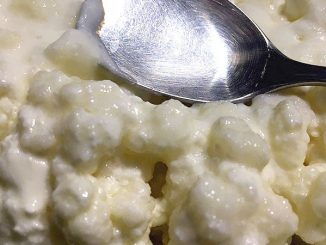
As we have written multiple times throughout this website, the benefits of milk Kefir are numerous. They are well studied and well documented. However, could the consumption of Kefir hide any threats? Could Kefir hide any risks and pose any dangers?
In most cases, and for healthy people, Kefir has no contraindications. To our knowledge, there are no registered cases of serious adverse reactions in healthy people due to the intake of Kefir, regardless of the quantity.
In other words, if you’re healthy, Kefir can’t harm you in any way and you can only benefit of its virtues. You can’t get a Kefir overdose, no matter how much you’ve taken.
However, some people, and in some cases, may face problems when introducing Kefir to their diets, and therefore should be cautious.
Let’s look into these possible situations and clarify for which health conditions the consumption of Kefir should be approached with caution, and in some cases even disadvised.
Danger #1: Milk allergy
While affecting very few people, this is still by far the #1 risk Kefir may pose, because the reactions of the body to allergens can be violent. And no, the fact that Milk Kefir is usually better accepted by lactose-intolerant people doesn’t make it harmless to people affected by milk allergies.
Lactose intolerance and milk allergy are very different things. While lactose intolerance is a relatively mild health condition that can easily be treated or prevented, milk allergy is a serious autoimmune disorder that should be addressed with the utmost care as it may lead to severe and even life-threatening situations.
Although fermentation of Kefir decreases the amount of lactose in milk, making it acceptable for people with lactose intolerance, it still contains all ingredients that may trigger allergic reactions in people affected by a milk allergy.
So, if you have ever experienced any allergic reactions to milk or dairy products forcing you to avoid milk products altogether, you’d better stay away from Kefir too.
Danger #2: Diabetes
Although Kefir is not only a low-carb and low-sugar food but also can lower cholesterol and blood sugar levels, diabetics must be cautious with Kefir and especially with commercially sold Kefir products.
The point here is that the longer Kefir ferments, the fewer carbohydrates and the less lactose (milk sugar) it contains. Additionally, the longer Kefir ferments, the more its beneficial effects on diabetes get accentuated. These effects are a decrease in fasting blood glucose levels, a decrease in levels of total cholesterol, blood pressure regulation, etc.
However, with poorly fermented and almost fresh Kefir these benefits may fade away and even reverse their effect. Kefir that has not been properly fermented may still contain quantities of carbohydrates and lactose that could be harmful to diabetics.
This is especially valid for commercially sold Kefir packs. In most cases packaged Kefir is pasteurized after its initial fermentation, preventing it from secondary ferment and allowing considerable amounts of carbs and lactose to remain in the brew. The risk can be even higher when some producers add sugar to their Kefir to improve its taste, which is typical for Kefir containing fruit additives or other flavorings.
So, diabetics are encouraged to focus on making their Kefir at home and properly fermenting it until most of its carbs and lactose get converted into peptides and lactic acids that will benefit their disease.
Diabetics should always be cautious and carefully read all labels of commercial Kefir packages, as they may contain unexpected additives or amounts of lactose and other sugars that may be unacceptable for their health condition.
Danger #3: Immunosuppressive treatments
Kefir contains large amounts of live and actively growing bacteria, fungi, and yeasts. All of them are considered probiotic microorganisms, which means that they normally bring us a series of health benefits.
However, to keep all these live microbes under control, our bodies need a decent immune system able to counteract any eventual overgrowth of these microorganisms and maintain the balance.
Unfortunately, in certain cases, our immune system may be weakened by either a disease or some drugs. When our immune system is weak and doesn’t respond accordingly to all threats, the live bacteria of Kefir can run out of control and provoke dangerous bacterial or fungal infections.
AIDS is, for instance, one of the diseases that is known to drastically decrease the immune defenses of the body.
The immune system can also be weakened or compromised by medical therapies known as immunosuppressive treatments. These are applied when the immune system has to be temporarily “deactivated” for one reason or another. For instance, immunosuppressive treatment is usually applied after an organ transplant to stop the immune system from rejecting the transplanted “foreign” organ.
Chemotherapy is another method that negatively affects the immune response of our body. In this case, consumption of Kefir might not only be dangerous but also increase the undesirable side effects of this therapy.
In all these cases, when the immune system cannot ensure the right balance between “the good and the bad” bacteria in our bodies, it is best to avoid the consumption of foods containing live bacteria and fungi, and Kefir is definitely a part of this list.
Summary
Кefir has virtually no contraindication for healthy people and the consumption of Kefir is not even limited by a “prescribed dosage”. Healthy people can consume Kefir at will and with no risk.
However, some health conditions may be a concern when introducing Kefir to our diet and should be taken into consideration.
First of all, Kefir should be by all means avoided by people with allergies to milk and dairy products. Although Kefir is well accepted by lactose-intolerant people, it still contains the ingredients able to trigger allergic reactions in people affected by a milk allergy.
Diabetics should also be slightly cautious with Kefir. Although Kefir can be beneficial for most cases of diabetes, people affected by this disease should be aware that Kefir that has not been properly fermented can contain carbohydrates and lactose in quantities that may not be acceptable for diabetics. Diabetics are therefore advised to properly ferment (long enough) their homemade Kefir and avoid commercial Kefir packages that may contain added sugars and may not be fermented to the desired level.
Kefir is also not suitable for people with a weakened immune system for one reason or another. The immune response of the body can be compromised either by diseases like AIDS, or by some medical therapies like immunosuppressive treatment after organ transplants, or by chemotherapy.



